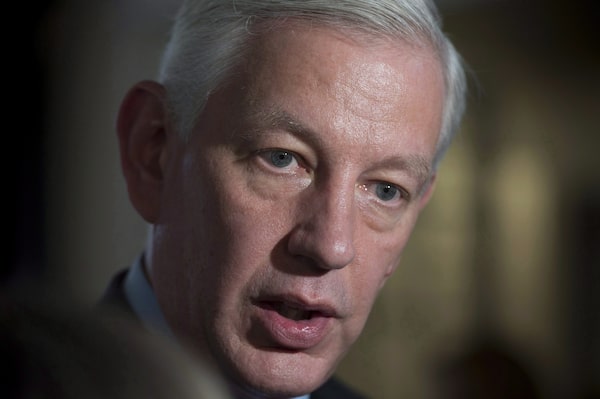
Dominic Barton accepted the job as Canada's ambassador to China at a moment of pointed difficulty between the two countries.Paul Chiasson/The Canadian Press
For years, Canada’s new ambassador to China spent his days chatting with the captains of global industry as the most senior figure at consultancy McKinsey & Co. Now that he is Ottawa’s chief representative to the world’s second-largest economy, however, Dominic Barton has been thrust into a role he himself doesn’t entirely understand.
“My problem is, I don’t even know what I don’t know. But I’m hoping that people are going to help me with that,” Mr. Barton told a group of foreign students at Tsinghua University weeks after the Trudeau government declared him its new emissary to China.
In his comments, Mr. Barton shed new light on his background, his thinking and his high-profile decision to come to Beijing for Canada, a departure from the corporate world and the board positions, including at miner Teck Resources Ltd., he accepted after leaving McKinsey.
“If you’re asked to do something, I think you should think about, very seriously, if you want to say no,” he said, according to a transcript reviewed by The Globe and Mail. Those with a business background possess skills in organization, relationships and focus that can be helpful, he said.
“I don’t think you have to think of yourself as a diplomat. I think you have to think of yourself as someone who is trying to help make the system better,” he said, arguing that it’s preferable to make an effort than sit by hoping others will contribute.
“I think more people need to try and do it,” he said, adding: “That’s kind of my spirit.” He recounted a conversation in which his wife was asked about him becoming a diplomat. “She said, ‘No, he’s become an ambassador. Time will tell as to whether he’s a diplomat.’”
Mr. Barton accepted the job in Beijing at a moment of pointed difficulty between Canada and China, after the arrest in Vancouver of Meng Wanzhou, an executive of Huawei Technologies Co. Ltd., and the subsequent detention in China of Canadians Michael Kovrig and Michael Spavor. Chinese courts sentenced two other Canadians to death on drug-related charges, while China blocked imports of key Canadian agricultural products, most notably canola.
In November, Prime Minister Justin Trudeau praised Mr. Barton by name after China resumed imports of Canadian beef and pork. As ambassador, Mr. Barton has visited Mr. Kovrig and Mr. Spavor in detention.
Mr. Barton himself has declined interview requests and avoided making public remarks, in part because of the transition in political leadership in Ottawa, where François-Philippe Champagne replaced Chrystia Freeland as foreign affairs minister after the federal election.
His comments to students in Beijing delineated a philosophy of leadership that he assembled in his years at McKinsey, including his views that corporate leaders must be bold, devote particular attention to human resources and be sensitive to the global frustrations with inequality brought by the capitalist system in recent decades. “We have a more fractured, angrier world,” he said.
But he also described a broader view of China, and of international relations, that aligns with demands from Canada’s corporate establishment, which wants a rapid end to tensions and a return to business as usual.
He used his own experience with Russia as an example, citing an occasion when the White House called to warn him against travel to a conference in Saint Petersburg. He went anyway, saying there is value in seeking common ground even in the midst of political friction. “If you don’t communicate, then you’re going to make things worse,” he said.
“I think you need engagement.”
Engagement has for decades been the byword of a moderate China policy among the political and academic establishment in Canada and other Western countries. But the concept has come under pressure in recent years. Experts question whether it remains a reasonable approach as China under President Xi Jinping adopts a more assertive foreign policy and muscular domestic rejection of what it calls Western principles, including traditional conceptions of human rights, an independent judiciary and a market economy with minimal government intervention.
But Mr. Barton, drawing on his experience with critics of Teck, said it is valuable to spend time with antagonists to understand “where they’re coming from and why they think that.”
In the past, Mr. Barton has called himself a “bull on China,” and he has not distanced himself from that view. In Beijing, he described China’s leading contributions to global economic growth over the past decade. In the world today, “we have one big force which is the rise of Asia, with China very much at the centre of that. It’s going to create humungous amounts of growth, opportunities for the world,” he said. ”There’s a lot of sectors that are going to be very exciting.”
But he also raised a voice of caution, noting the confluence of numerous and heated conflicts, between India and Pakistan over Kashmir, between Korea and Japan, between the U.K. and Europe, between the United States and China – and looming over it all, the geopolitical instability that accompanies the rising of a new global power.
“I don’t think anyone has the intent to go to war,” he said. “But I don’t think people intended to go to war in World War One, either. It was mistakes that were made.”
Our Morning Update and Evening Update newsletters are written by Globe editors, giving you a concise summary of the day’s most important headlines. Sign up today.
 Nathan VanderKlippe
Nathan VanderKlippe